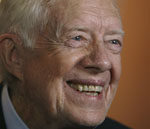
“One of the most urgent responsibilities the international community faces is in Sudan, which is facing a renewal of nationwide violence.” So begins the call-to-action from former president Jimmy Carter that ran in the Washington Post yesterday.
In the editorial, Carter strikes a diplomatic tone, dividing the focus neatly between the accomplishments (though often delayed) made since 2005 between the Sudanese parties, and the weighty challenges that are hurtling toward Sudan at top speed.
This balanced writing is in fact a reflection of the current state-of-play in the country. As Carter alludes, Sudan as a whole has only just arrived at a precarious tipping point, where accomplishments and the yet-to-be accomplished hang in equilibrium; where neither peace nor war has been fully realized. (Certainly, for the people who have suffered attacks on their villages, years of displacement, sexual violence, loss of family members, and other injustices, this high-level discussion of war versus peace is no consolation.)
This balance cannot be preserved forever. Many approaching events, including elections, referenda, and popular consultations, will force Sudanese parties to tip the scale dramatically one way or the other. If tipped the wrong way, as Carter says, “all this progress is in danger of being abandoned.” None of the victories made in the last five years will matter at all, if the challenges of holding free and fair elections, referenda, and post-referendum issues lead to the collapse of the peace agreement and a return to war.
To move Sudan from its precarious position toward peace will require vigilance from the international community. Carter calls for the community’s help in implementing South Sudan’s referendum results. The former president also made a special plea for electoral assistance. Calling out an ill-functioning National Election Commission and an “unacceptably repressive” law still in place, Carter reminds readers of the import of successful elections, an event that would allow many previously marginalized groups their first experience with a transparent process.
A plea for action coming at this level, issued by not only a former president, but a widely-respected diplomat, human rights activist, and global leader – whose own center is monitoring upcoming elections – underscores the gravity of the situation in Sudan. More importantly, though, the statement comes none too early and desperately needs to reach the ears of decision-makers around the world.
Photo: Former U.S. President and founder of the Carter Center, Jimmy Carter. (AP)

